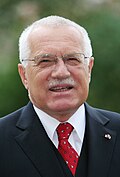Euroscepticism
Euroscepticism is the criticism of the European Union (EU). Some observers also say that the total rejection of the EU is euroscepticism.[1] Euroscepticism should not be confused with Anti-Europeanism, which is the dislike or fear of European culture and/or people.
Eurosceptics says that the European Union weakens the nation state. They also say that the European Union is too bureaucratic (meaning that important decisions are made by officials who aren't elected).[2][3] In 2016, the countries with the most unfavourable view of the EU were Greece, France, Spain and the United Kingdom.[4]
The rise of right-wing populist parties in Europe have been contributed to their Eurosceptic views.[5] On 23 June 2016, the United Kingdom voted to leave the European Union with 52% voting to leave.
Polls
In November 2015, a poll showed that those with a positive image of the EU went down from 52% in 2007 to 37%. Distrust of the EU was highest in Greece (81%), Cyprus (72%), Austria (65%), France (65%) Germany (63%), the United Kingdom (63%) and the Czech Republic (63%).
Parties
Some major Eurosceptic parties are shown below (organized by country):
|
|
|
Euroscepticism Media
Percentage responding that their country on balance benefited from being a member of the EU at Eurobarometer 2023:
91–100% 81–90% 71–80% 61–70% 51–60% Heinz-Christian Strache, former leader of the Austrian hard Eurosceptic party FPÖ
- Volen Siderov ATAKA.jpg
Volen Siderov, leader of the Bulgarian Eurosceptic party Attack
Václav Klaus, former Eurosceptic President of the Czech Republic
Pia Kjærsgaard, member (and former leader) of the hard Eurosceptic party Danish People's Party (Dansk Folkeparti), the fifth-largest represented in the Danish parliament and the fifth-most represented in the European Parliament
Marine Le Pen, prominent French MEP, former leader and former presidential candidate of the National Front (France) and of the Europe of Nations and Freedom group
"Referendum on saving the euro!" Poster from the party Alternative for Germany (AfD) regarding Germany's financial contributions during the Eurozone crisis
An anti-EU poster in Hungary
References
- ↑ Matthew (26 October 2011). "Why anti-EUism is not left-wing". Workers' Liberty. Alliance for Workers LibertyAnti-Europeanism. Retrieved 31 January 2016.
- ↑ Kopel, David, Silencing opposition in the EU, Davekopel.org, archived from the original on 29 December 2016, retrieved 18 February 2015
- ↑ Hannan, Daniel (14 November 2007). "Why aren't we shocked by a corrupt EU?". The Daily Telegraph (London). https://www.telegraph.co.uk/comment/3644012/Why-arent-we-shocked-by-a-corrupt-EU.html. Retrieved 2 May 2010.
- ↑ Euroscepticism on the rise across Europe as analysis finds increasing opposition to the EU in France, Germany and Spain, 8 June 2016, retrieved 1 August 2016
- ↑ Han Werts, Marcel Lubbers, and Peer Scheepers (2013) Euro-scepticism and radical right-wing voting in Europe, 2002–2008: Social cleavages, socio-political attitudes and contextual characteristics determining voting for the radical right Archived 2016-02-05 at the Wayback Machine, European Union Politics, vol. 14 no. 2: 183–205.




